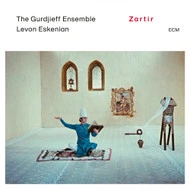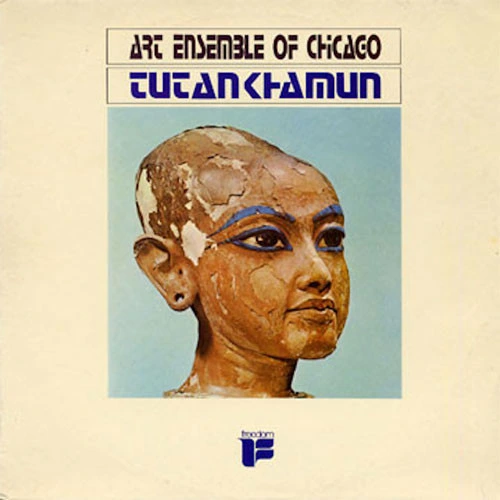Gurdjieff's Work Juxtaposed with Other Armenian Bards & Troubadours on Vinyl LP!
"Georges Gurdjieff composed and dictated volumes of piano music. Levon Eskenian's Gurdjieff Ensemble reclaims these pieces from the salons of Paris and takes them back to their roots in the Caucasus. They reveal their origins and themselves." -David Honigmann, Financial Times
With his inspired arrangements for folk instrumentation, Levon Eskenian has brought about a re-evaluation of the music of G.I. Gurdjieff (ca. 1877- 1949) and given us many new insights into the sources that inspired the Armenian-born esoteric teacher, philosopher and composer.
Zartir, the third album from Eskenian's award-winning Gurdjieff Ensemble, is its most adventurous to date, and it opens several new channels of discovery. In several pieces with a focus on the voice, it situates Gurdjieff in a tradition of Armenian ashughs, bards and troubadours including Ashugh Jivani, Baghdasar Tbir and the legendary Sayat-Nova. Gurdjieff's father, an ashugh who performed under the name Adash, was part of this tradition, and his wide-ranging repertoire would have exposed his son, at an early age, to music and verse from many places. The texts of these songs also resonate with Gurdjieff's central messages, especially title piece "Zartir" by Baghdasar Tbir (1683-1768). "Zartir" means "Wake up!," and its lyrics seem to anticipate Gurdjieff's contention that Mankind is asleep and needs to be roused from its torpor.
Elsewhere, Eskenian emphasizes pieces written for sacred dance, reaching a high point with "The Great Prayer," an entrancing collaboration between the Gurdjieff Ensemble and the National Chamber Choir of Armenia, which draws upon ritual music of multiple faiths. Arranger Eskenian says, "I believe 'The Great Prayer' is more than a mere 'composition.' It is one of the most profound and transformative pieces I have encountered in Gurdjieff's work."
References for Eskenian's work on Zartir have included the piano transcriptions and symphonic scorings of Gurdjieff's gifted amanuensis, the Ukraine-born composer Thomas de Hartmann. As with the ensemble's 2011 debut album (Music of Georges I. Gurdjieff), however, Eskenian's arrangements for folk instruments radically transform the material, and give the listener the experience of hearing Gurdjieff's music in full, radiant color, flowering in its natural context.
Levon Eskenian was born in Lebanon in 1978. In 1996 he moved to Armenia where he currently lives. In 2005 he graduated from the Yerevan Komitas State Conservatory where he obtained a Master's degree studying the piano with Professor Robert Shugarov. In 2007 he took his Postgraduate degree in the class of Professor Willy Sargsyan. He has also studied composition, organ and improvisation classes at the Conservatory and harpsichord in Austria and Italy with the English organist and harpsichordist Christopher Stembridge.
One of the most active figures in Armenia's musical life, a director of various ensembles and artistic institutions, Eskenian has performed both as a soloist and chamber musician with a programme ranging from early baroque to contemporary music in Europe, Middle East, Asia, South America, and Australia. He has organized numerous concerts, lectures, master classes and festivals in Armenia. He is the founder of the Akna Cultural Society, established to study and promote repertoire ranging from ancient music and early baroque to contemporary music.
In 2008, Eskenian founded the Gurdjieff Ensemble bringing together masters of Armenian and Middle Eastern instruments to play his arrangements of the G.I. Gurdjieff/Thomas de Hartmann piano music. The debut album on ECM records, Music of G.I. Gurdjieff was widely acclaimed and won prizes, including the Edison Award as Album of the Year in 2012.
A second album, devoted to the music of Komitas, widened the scope of the Gurdjieff Ensemble's project and also met with a very positive press response. "By turns haunting, playful and rapturous, this music is endlessly fascinating," the American Record Guide noted. "Be warned, you can lose yourself in this album and never want to come back."
Zartir was recorded in Yerevan in 2021 by Tigran Kuzikyan and mixed and completed in Munich in November 2022 by producer Manfred Eicher and engineer Michael Hinreiner. The album's striking cover image is from Sergei Parajanov's allegorical art film The Colour of Pomegranates, based upon the life of Sayat-Nova.
Features
- Vinyl LP
- Recorded December 2021, Radio Recording Studio Yerevan
- Made in Germany
Musicians
| Vladimir Papikyan | voice, santur, burvar, tmbuk, singing bowls |
|---|---|
| Emmanuel Hovhannisyan | duduk, pku |
| Meri Vardanyan | kanon |
| Armen Ayvazyan | kamancha, cymbal |
| Gagik Hakobyan | duduk |
| Norayr Gapoyan | duduk, bass duduk, pku |
| Avag Margaryan | blul |
| Aram Nikoghosyan | oud |
| Astghik Snetsunts | kanon |
| Davit Avagyan | tar |
| Mesrop Khalatyan | dap, tmbuk, bells, triangle |
| Orestis Moustidis | tombak |
| Levon Eskenian | artistic director |
| National Chamber Choir of Armenia | |
| Robert Mlkeyan | director |
Selections
Side 1:
George I. Gurdjieff (c. 1877-1949)
- Pythia
- No. 10
- Sayyid Chant and Dance No. 41
- Introduction and Funeral Ceremony
- Oriental Dance
Ashough Jivani (1846-1909)
- Kankaravor Enker (Friend of Talents)
Sayat-Nova (1712-1795)
- Dard Mi Ani (Do Not Fret)
George I. Gurdjieff
- Thirty Gestures
Side 2:
George I. Gurdjieff
- Prayer and Despair
- Sayyid Chant and Dance No. 42
Sayat-Nova
- Ashkharhes Me Panjara e (The World Is a Window)
George I. Gurdjieff
- Trembling Dervish
Baghdasar Dbir (1683-1768)
- Zartir (Wake Up)
George I. Gurdjieff
- The Great Prayer



 Turntable Accessories
Turntable Accessories Headphone Accessories
Headphone Accessories Cable Accessories
Cable Accessories Vinyl Accessories
Vinyl Accessories Compact Disc Accessories
Compact Disc Accessories









